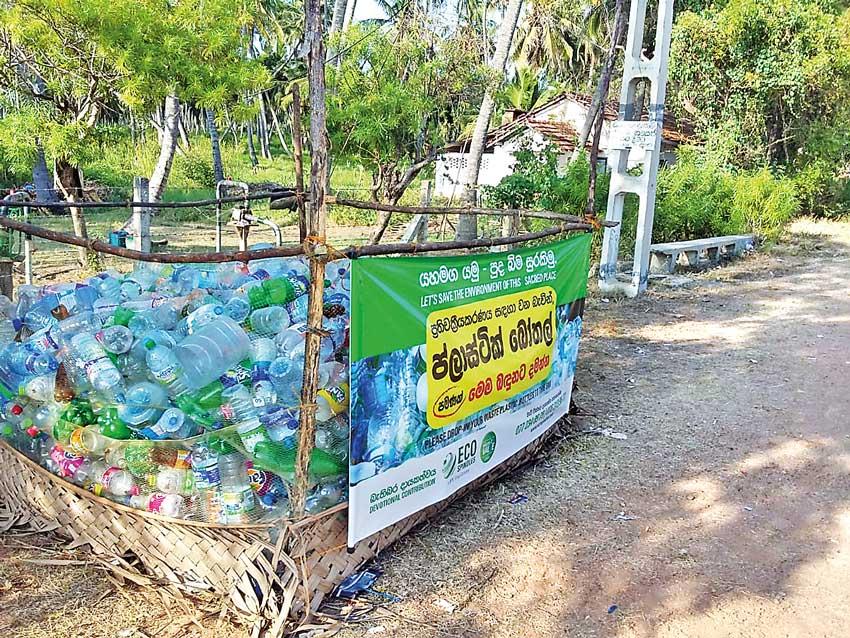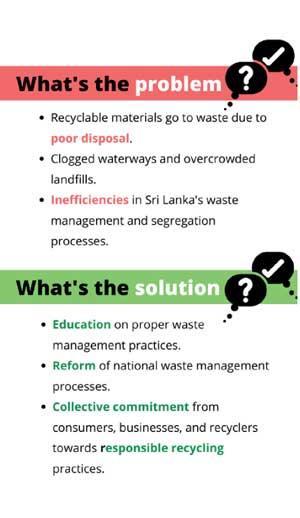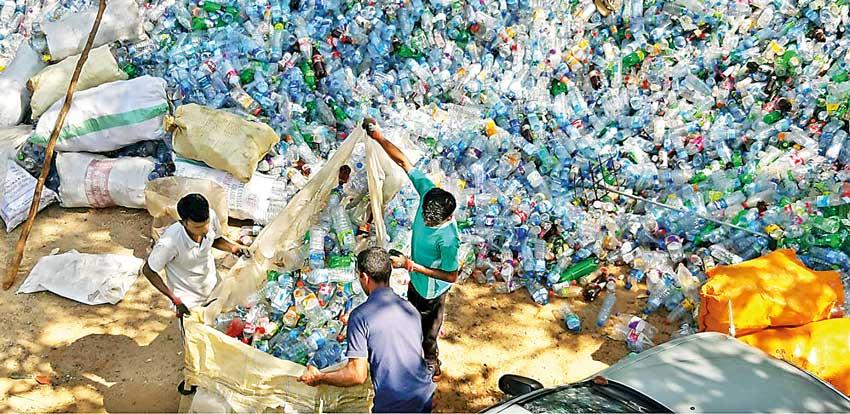14 Jan 2021 - {{hitsCtrl.values.hits}}

 “Reduce, reuse, and recycle”- a household phrase you’ve probably heard over and over again either through school, from awareness campaigns or even on TV.
“Reduce, reuse, and recycle”- a household phrase you’ve probably heard over and over again either through school, from awareness campaigns or even on TV.
This commonly used phrase is one expected to enthusiastically and optimistically drive the mind-sets of those listening, to essentially do the right thing and help efforts to save the environment.

In Sri Lanka, waste segregation and management is a topic that has been gradually building up notoriety due to inefficiencies and lack of proper implementation. The Western Province alone generates around 7,500 metric tons of solid waste every day of which only 3,500 metric tons are collected (Central Environmental Authority, 2018).
Over the past few years, we’ve seen these poor practices result in overcrowded landfills, environmental deterioration and even economic drawbacks. Perfectly recyclable materials go to waste due to poor disposal, segregation and management practices across all stakeholders, from homes to municipalities and local authorities.
Poor disposal practices often raise alarms when waste such as plastic bottles end up clogging waterways and overcrowding landfills. This deters the image of a material that if properly disposed of and segregated, can be recycled and potentially benefit the economy.
As we now know, the government will be implementing a ban on single-use plastics this year. While this is a sustainable step forward, an innovative solution needs to be enforced to make sure that plastics such as PET don’t meet the same fate, as they make an invaluable contribution to communities and the overall economy.
The ability to use plastic in packaging has opened doors to making products more accessible and affordable to communities around the country. Such packages are generally cheaper to produce, easy to transport due to minimal breakages and store. They also generate a lower carbon footprint in production than most other materials.
This cheaper alternative has enabled beverages to be made available to most rural communities, for them to enjoy such products otherwise limited to the more affluent areas of the country. A classic example is a milk sachet or a smaller-sized milk product.
Data from the Income and Expenditure Survey (2016) reports that the rural sector in Sri Lanka spends an average of 7.8 percent on milk and milk food expenditure. The ability to provide the same product at economical prices will mean that products are no longer out of financial reach for certain socio-economic groups. Their demands and need for these products will continue. This is why it becomes all the more important to strategically address the issue of waste reduction and recycling in the long term.

Problem with our current waste mgt. system
Although governments and local authorities have made claims that waste segregation and management procedures have been implemented, it is clear that there are still inefficiencies at almost all levels. For example, in 2008, the Central Environmental Authority (CEA) of Sri Lanka initiated the “Pilisaru Programme”, a 10-year waste management programme with the goal of achieving a “Waste Free Sri Lanka by 2018”.
The lack of a proper strategy for this programme made it very ineffective, and the failure to address this mounting issue led to unsanitary and overpopulated landfills in Karadiyana, Bloemendhal and Meethotamulla.
Waste management requires reform from the roots, starting from household waste management.Awareness should be raised on the fact that waste collected in homes should be properly disposed of separately, so that collectors are able to collect food waste, paper and plastics individually.
Improper methods of waste collection and segregation should also be reformed, as even though households would separate their waste for collection, recyclable waste is either collected with other waste and contaminated or made unrecyclable, and separately collected waste would end up in the same landfill, making the whole process of waste segregation ineffective.
The lack of policy enforcement and supervision of the recycling sector has prompted private SME plastic waste collectors and segregators to rise. There currently exists a network of over300 registered and unregistered plastic collectors and recyclers in Sri Lanka (Central Environmental Authority, 2019).
This sector needs to be further strengthened, as these small business do not have the infrastructure or support needed to implement efficient waste recycling practices. It is important to keep in mind that SME recyclers and the sector at large could be at the risk of losing their jobs if a potential ban on all PET plastics is enforced by the government.
What needs to be done?
Primarily, the government needs to review and refine waste management processes in the country. They should promote an innovative strategy thatensures that local authorities and municipalities implement a seamless waste management system, with stringent protocols and provisions for the collection and segregation of waste. This would also help strengthen the recycling sector.
For example, Japan maintains a unified waste management protocol that has been successful in controlling segregation, collection, transportation and recycling. The responsibility of the detailed process that Japan follows is strategically dispersed across a plethora of stakeholders including authorities and consumers, prompting them to maintain standards in separating recyclable and non-recyclable waste at homes, collecting, dumping, incinerating or recycling (Management and Recycling Department Policy Planning Division, 2012).
Apart from the government, producers play a big role in encouraging proper disposal and segregation of plastic waste with the Extended Producer Responsibility (EPR) policy, where producers take responsibility for the treatment and/or disposal of post-consumer products. As a start, manufacturers of PET bottles and large beverage brands can standardize their bottles and bottle caps and make all of their bottles transparent, as this can assist and ease the process of segregation, cleaning and recycling when the bottles come to recyclers, post-consumption.
Consumers should be made aware of the correct recycling practices to follow. To raise awareness and influence proper disposal practices for recyclable waste, greater public engagement can be achieved through beach or tourist hotspot clean-up programmes and similar initiatives.
For example, Eco-Spindles has initiated simila rprogrammes over the years such as the Kataragama Waste Management Project in partnership with Coca-Cola Sri Lanka’s Give Back Life” initiative, where we collected 4,227 kgs of PET from within the religious site in 2019.
Not only was it a collection drive, we also encouraged pilgrims and visitors to be more conscious of their plastic disposal, thereby making this more than just an initiative - rather, a movement, inspiring more people to contribute by supplying plastic waste from their own homes, workplaces and communities.
PET Plastic is not waste, it’s a valuable commodity
Sri Lanka’s recycling sector’s potential is very high, and this has probably gone unnoticed over the past. One of the most economically benefitting and environmentally-friendly strategies is the development of a circular economy, which would through recycling remain a major drive, promising a seamless and rejuvenating industry lifespan, benefitting private SME collectors and segregators. Not only would this empower the local recycling sector, but we would also be environmentally conservative, while recycling and adding value to collected PET bottles for production and exporting.
With the government’s upcoming ban for single-use plastics and a goal to develop and preserve a sustainable environment, the prevailing issues with Sri Lanka’s waste management should be addressed with a proactive approach, ideally by strengthening waste management and fully realizing the potential of recyclable materials.
Just imagine, all we have to do is be cautious and smart with segregating and managing our waste. That would drastically reduce our ecological footprint which would otherwise be enlarged by the use of virgin materials to produce products that recycled plastic could instead, produce. A truly policy-driven economic and environmental win for everyone.
(The writer is the Managing Director and Chief Executive Officer of BPPL Holdings PLC. BPPL Holdings is a pioneer in developing and creating eco-friendly products which sensibly make use of natural resources. Through their subsidiaries Beira Brush (Private) Limited and Eco-Spindles (Private) Limited they move forward in manufacturing products that help create a cleaner and greener Sri Lanka whilst generating value for customers worldwide).
24 Dec 2024 22 minute ago
24 Dec 2024 1 hours ago
24 Dec 2024 3 hours ago
24 Dec 2024 3 hours ago
24 Dec 2024 4 hours ago